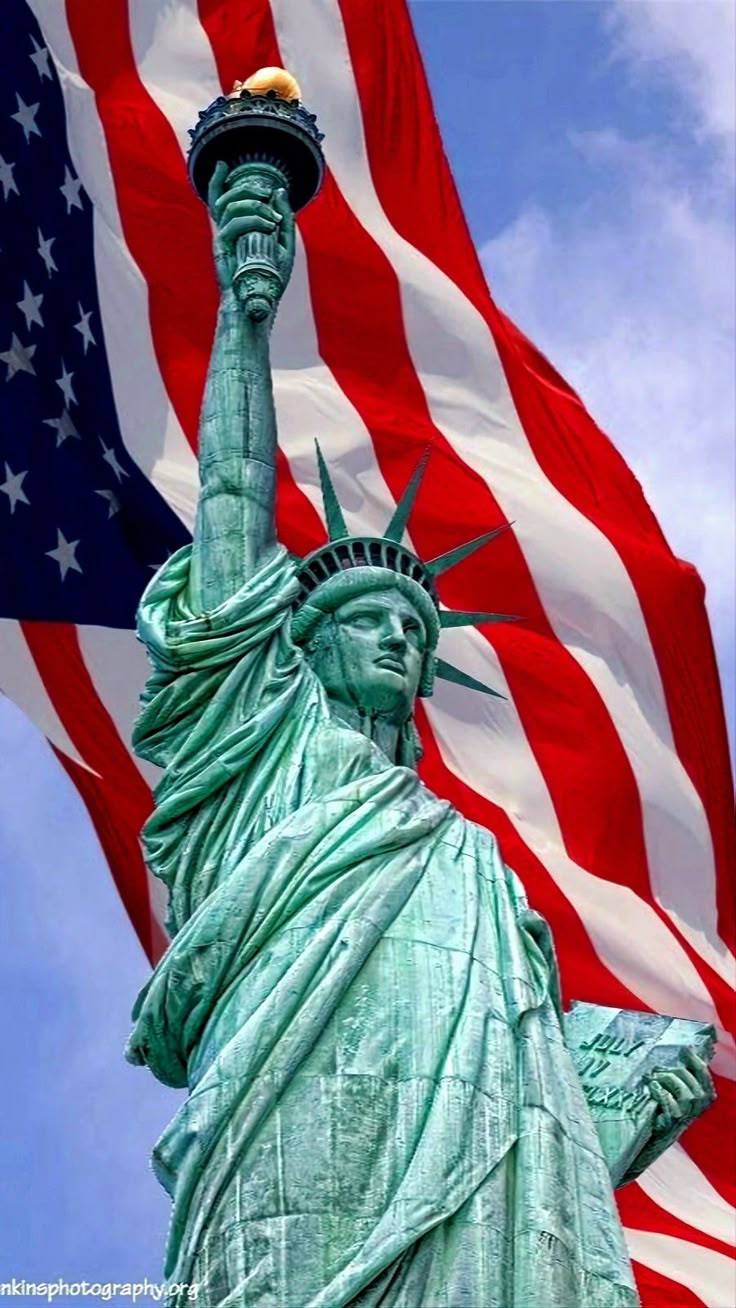The Land and People of the United States
The United States of America, commonly known as the USA or simply America, is a vast and diverse country located primarily in North America. Bordered by Canada to the north and Mexico to the south, it spans over 3.8 million square miles, making it the third-largest country in the world by land area. The U.S. consists of 50 states, including Alaska and the island state of Hawaii. This wide expanse of land results in a rich variety of landscapes, ranging from the snowy peaks of the Rocky Mountains to the tropical beaches of Florida and Hawaii. Equally diverse is the country’s population, which includes people of all races, religions, and ethnic backgrounds. With over 330 million residents, the U.S. is the third most populous country in the world, home to a melting pot of cultures brought together through centuries of immigration.
Government and Political System
The United States operates under a federal republic and democratic system, established by the U.S. Constitution in 1787. Power is divided among three branches: the legislative (Congress), the executive (headed by the President), and the judicial (led by the Supreme Court). This system of checks and balances helps maintain stability and prevent the abuse of power. Every four years, citizens vote to elect a president, and elections are held regularly to choose representatives and senators at both state and national levels. The two dominant political parties, the Democratic Party and the Republican Party, often reflect differing ideologies, especially on social and economic issues. Despite political polarization, democratic values such as freedom of speech, press, and religion remain central to American life.
Economy and Global Influence
As of the 21st century, the United States possesses the world’s largest and most technologically advanced economy. It is a global leader in finance, technology, medicine, and innovation, with major corporations such as Apple, Google, Microsoft, and Amazon headquartered there. The U.S. dollar is the world’s primary reserve currency, and Wall Street serves as a hub for international investment. Beyond economics, the U.S. exerts significant cultural and political influence worldwide. Through Hollywood films, music, fashion, and social media, American culture has permeated many parts of the world. Politically, the U.S. plays a leading role in international organizations such as the United Nations, NATO, and the World Bank, often shaping global policy on issues ranging from climate change to defense.
Culture, Education, and Innovation
American society values individual freedom, opportunity, and the pursuit of the “American Dreamâ€â€”the belief that anyone, regardless of background, can achieve success through hard work. This ethos has led to a vibrant culture of entrepreneurship and innovation. The U.S. is also renowned for its higher education system, with prestigious universities such as Harvard, MIT, and Stanford attracting students from all over the globe. American culture celebrates diversity, and this is reflected in its food, music, festivals, and literature. Cities like New York, Los Angeles, and Chicago are cultural centers that offer a mix of traditions from around the world. At the same time, the country continues to face challenges such as income inequality, racial tensions, and environmental concerns. Nonetheless, the United States remains a nation of resilience, constantly evolving while striving to uphold the principles of liberty, equality, and justice.
---
Let me know if you'd like the article tailored for a specific audience (e.g., students, travelers, or business professionals).
Sure! Here's the expanded article about the United States with approximately 1,000 words across four paragraphs, incorporating an additional 300 words:
---
The Land and People of the United States
The United States of America, commonly known as the USA or simply America, is a vast and geographically diverse country located primarily in North America. It shares borders with Canada to the north, Mexico to the south, the Atlantic Ocean to the east, and the Pacific Ocean to the west. With a total area of about 3.8 million square miles, it is the third-largest country in the world by both land area and population. The United States consists of 50 states, including the non-contiguous states of Alaska and Hawaii, as well as several overseas territories such as Puerto Rico and Guam. The nation's physical geography ranges from deserts and mountain ranges to forests, lakes, and coastlines, offering a wide variety of natural environments.
The U.S. is known for its diverse population, shaped by centuries of immigration from all over the world. People from different ethnic, cultural, and religious backgrounds live side by side, contributing to the country's identity as a “melting pot.†Major cities such as New York, Los Angeles, Houston, and Miami reflect this diversity in their demographics, food, art, and languages spoken. English is the primary language, but Spanish, Chinese, Tagalog, and many other languages are commonly spoken. This cultural blend influences everything from national holidays to regional traditions, making the United States one of the most culturally dynamic countries in the world.
Government and Political System
The United States operates under a federal constitutional republic, a system of government defined by a division of powers among the federal and state levels. The U.S. Constitution, adopted in 1787, serves as the supreme law of the land and has guided the nation for over two centuries. The federal government is made up of three co-equal branches: the executive branch, headed by the President; the legislative branch, comprised of the Senate and House of Representatives (together known as Congress); and the judicial branch, which includes the Supreme Court and other federal courts. This structure is designed to ensure a balance of power and to prevent any one branch from becoming too dominant.
The United States is one of the oldest continuous democracies in the world. Citizens over the age of 18 have the right to vote in regular elections to choose their leaders and influence public policy. The two dominant political parties, the Democratic Party and the Republican Party, often hold contrasting views on issues such as taxation, healthcare, immigration, and foreign policy. In addition to federal elections, state and local governments hold elections for governors, mayors, and legislators, allowing citizens to influence governance at every level. Despite political division and partisanship, the American political system values civil liberties such as freedom of speech, the right to protest, and freedom of the press—principles enshrined in the Bill of Rights.
Economy and Global Influence
The United States has the largest economy in the world, driven by a combination of abundant natural resources, advanced infrastructure, technological innovation, and a highly skilled labor force. Its gross domestic product (GDP) accounts for a significant portion of the global economy. The country leads in industries such as finance, healthcare, technology, manufacturing, and agriculture. Major economic hubs like New York City, San Francisco, and Chicago are home to influential multinational corporations and financial institutions. The U.S. is also a global leader in scientific research, with billions of dollars invested annually in education, healthcare, and innovation.
American cultural and political influence extends across the globe. Hollywood movies, popular music, fashion, and fast-food chains are just a few examples of how American culture has become part of daily life in many other countries. The U.S. is also a key player in international diplomacy and defense, being a founding member of the United Nations and a major contributor to global peacekeeping and humanitarian efforts. Its military is the most powerful in the world, and it maintains alliances through organizations such as NATO. However, America's role in global affairs is not without controversy, and its policies are often debated both at home and abroad. Issues such as climate change, immigration, and trade continue to shape the country’s relationship with the international community.
Culture, Education, and Innovation
The culture of the United States is characterized by a strong belief in individualism, freedom, and opportunity. These values have shaped the American Dream—the idea that anyone, regardless of background, can achieve success through hard work and determination. This belief has inspired generations of entrepreneurs, artists, scientists, and inventors. The U.S. is home to many of the world's top universities, including Harvard, Stanford, MIT, and Yale. These institutions attract students from around the world and serve as centers of cutting-edge research and innovation. The country is also a global tech hub, with Silicon Valley as a symbol of digital innovation and entrepreneurship.
American life is rich with cultural expression, from literature and film to cuisine and sports. Each region of the country offers a unique flavor of American identity. The South is known for its music traditions like jazz and blues, the Midwest for its strong community values, the West Coast for its creativity and innovation, and the Northeast for its historical significance and academic excellence. Sports play a major role in American society, with football, basketball, baseball, and soccer drawing massive national audiences. Holidays such as Thanksgiving, Independence Day, and Memorial Day reflect the nation’s historical roots and shared values.
At the same time, the United States continues to face significant challenges. Issues such as racial inequality, gun violence, political polarization, healthcare access, and climate change remain central to national debates. Yet, the country has a long tradition of resilience and reform. Social movements and public engagement continue to shape the national narrative and push the country toward greater inclusivity and justice. Despite its imperfections, the United States remains a symbol of freedom and possibility for many around the world, constantly redefining itself in pursuit of a more perfect union.
---
Let me know if you want this turned into a PDF, presentation, or simplified for students.




No comments yet
Be the first to share your thoughts!